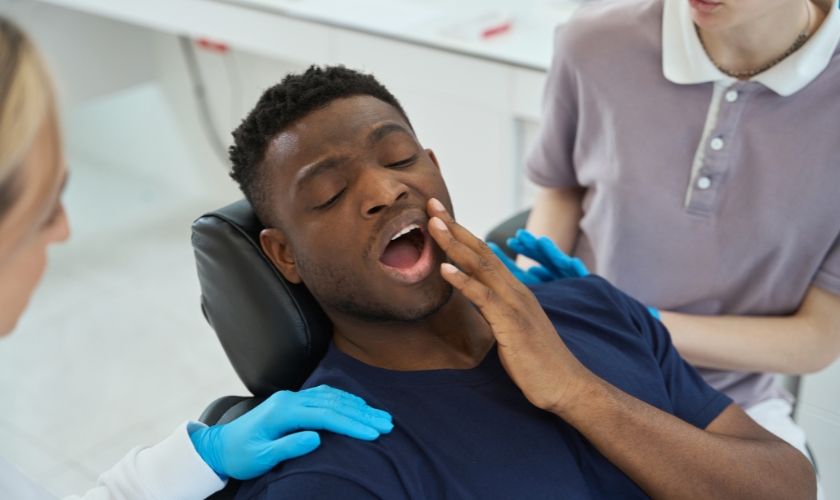
Dental emergencies can strike at any time, often when you least expect them. Whether it’s a sudden toothache, a knocked-out tooth, or a lost filling, knowing how to respond quickly can make all the difference. This blog will guide you through common dental emergencies and offer practical tips to handle them effectively, ensuring you’re never caught off guard.
Imagine you’re enjoying a meal when you suddenly feel a sharp pain or notice a tooth has become loose. Panic can set in, but don’t worry! You’re not alone. Many people face dental issues, and understanding what qualifies as an emergency can help you act swiftly. With the right knowledge, you can mitigate damage and possibly save your tooth. Let’s explore these situations together and empower you with the tools you need to keep your smile safe and healthy!
What Is a Dental Emergency?
Not every dental issue requires immediate attention, but some problems can’t wait. A dental emergency occurs when you experience intense pain, uncontrolled bleeding, or severe damage to your teeth or gums. These situations need immediate care to prevent further complications and permanent damage.
Here’s how to identify the most common dental emergencies:
- Intense pain: Persistent, severe tooth pain or sensitivity that doesn’t go away is often a sign of infection or injury.
- Bleeding: Uncontrolled bleeding from the gums or mouth, especially after trauma, needs quick attention.
- Swelling: Swelling in the face, gums, or mouth can indicate a serious infection or abscess.
- Damage to teeth: Broken, cracked, or knocked-out teeth require immediate treatment to prevent further damage and infection.
Knocked-Out Tooth: What to Do?
A knocked-out tooth can be alarming, but quick action might save your tooth. Acting within the first hour dramatically increases the chances of successful reattachment.
Here’s what to do if you knock out a tooth:
- Handle with care: Hold the tooth by the crown (the part that chews), not the root, to avoid contamination.
- Rinse gently: If dirty, gently rinse the tooth with water, but don’t scrub or remove any tissue fragments attached.
- Preserve the tooth: Place the tooth in a container of milk or saline solution. This keeps it moist and alive until you reach your dentist.
- See a dentist ASAP: Try to get an emergency dentist near you within 30 minutes to an hour for the best chance of saving your tooth.
Cracked or Broken Tooth: Quick Fixes
A cracked or broken tooth can lead to pain and sensitivity, but you can manage the situation before seeing an emergency dentist in Newton. Take immediate steps to protect your tooth and ease discomfort.
Here’s how to handle a broken or cracked tooth:
- Rinse your mouth: Clean your mouth with warm water to remove debris and prevent infection.
- Protect the tooth: Use dental wax or sugarless gum to cover the broken tooth’s jagged edges, protecting your mouth from cuts.
- Pain relief: Apply a cold compress to the outside of your mouth to reduce swelling and take over-the-counter pain relievers.
- Save the pieces: If a part of your tooth has broken off, store it in a clean container and bring it with you to the dentist.
Severe Toothache: Immediate Actions
Toothaches can feel unbearable, especially if they’re caused by an infection or decay. While home remedies won’t cure the problem, they can offer relief until you can see your dentist.
Here’s how to manage a severe toothache:
- Pain relief: Take over-the-counter pain medication like ibuprofen to reduce pain and inflammation.
- Cold compress: Apply a cold compress to the outside of your cheek to numb the pain and reduce swelling.
- Avoid triggers: Steer clear of hot, cold, or sweet foods, and avoid chewing on the side of the mouth with the toothache.
- See a dentist promptly: Toothaches are often caused by cavities or infections, so it’s essential to visit your dentist to address the root cause.
Lost Filling or Crown: Temporary Solutions
Losing a filling or crown can expose sensitive parts of your tooth, leading to discomfort or pain. You can take temporary measures to protect the tooth before you see your dentist.
Here’s what to do if you lose a filling or crown:
- Cover the tooth: Use dental cement, dental wax, or sugarless gum to cover the exposed area. This protects the tooth and reduces sensitivity.
- Keep the crown: If your crown falls out, clean it and keep it safe. Your dentist may be able to reattach it.
- Avoid hard foods: Stick to soft foods to prevent further damage to the exposed tooth.
While these measures are temporary, they can prevent further complications until you receive professional treatment.
Soft Tissue Injuries: Quick Response
Injuries to the gums, cheeks, or lips can cause bleeding and discomfort. Swift action can stop bleeding and reduce pain until you can get help.
Here’s how to manage soft tissue injuries:
- Stop the bleeding: Press gauze or a clean cloth on the affected area to stop bleeding.
- Cold compress: Apply a cold compress to the outside of your mouth to reduce swelling and numb the pain.
- Clean the area: Rinse your mouth with warm saltwater to cleanse cuts or tears and prevent infection.
- When to seek help: If the cut is deep or the bleeding doesn’t stop, visit your dentist or go to the emergency room immediately.
Soft tissue injuries can often be treated at home, but don’t hesitate to seek professional care if necessary.
When to Call Your Dentist Immediately?
Some common dental emergencies need more than just home care. Knowing when to call your dentist can make all the difference in saving your smile and preventing further issues.
Call your dentist right away if you experience:
- Uncontrolled bleeding: If you can’t stop the bleeding after a traumatic injury or surgery, it’s time to see a professional.
- Intense pain: Severe pain that doesn’t go away with over-the-counter medication can be a sign of infection or a serious issue.
- Swelling: Facial swelling, especially when accompanied by pain, may indicate an infection or abscess that needs immediate attention.
If you live in the area, search for an emergency dentist in Newton, KS, to handle any dental emergencies that arise unexpectedly.
Dental emergencies can strike when least expected, but knowing how to respond can make all the difference. From knocked-out teeth to severe pain, quick action prevents long-term damage and relieves discomfort. Always have a dental plan in place, and don’t hesitate to seek professional care when necessary. Whether you’re dealing with a lost filling or a soft tissue injury, staying calm and following the right steps can save your smile. For immediate care, contact Newton Dental Studio and ensure your dental health stays on track, even in emergencies.



